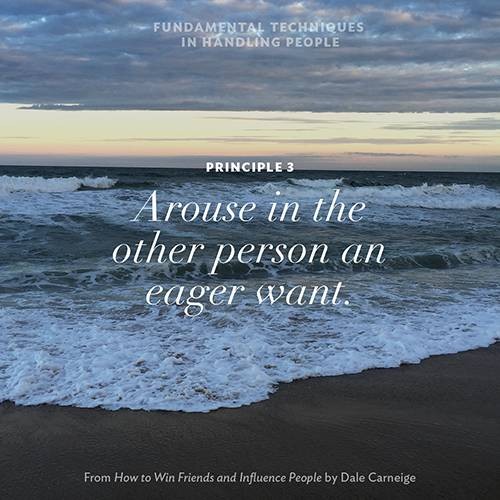Dale Carnegie’s How to Win Friends and Influence People remains a timeless guide to interpersonal relations, emphasizing empathy and understanding others’ perspectives. After delving into this classic, the profound impact of empathy in our daily interactions became strikingly clear. The book is rich with examples that highlight how empathy shapes our feelings and influences those around us. It spurred a deep reflection on moments where I may have overlooked or dismissed the feelings of others, be it strangers, colleagues, clients, or loved ones.
The potential benefits of enhanced empathy are immense. Reflecting on past behaviors, I recognized instances where work stress, pride, ego, and impatience clouded my judgment, blinding me to others’ emotions in my words, tone, and actions. This realization brought a wave of regret, fueling a commitment to personal improvement.
To solidify the book’s invaluable lessons, I created visual reminders of Carnegie’s principles, overlaying them on scenic travel photos. These graphics serve as daily prompts to apply these principles in all interactions.
Fundamental Techniques in Handling People
These foundational principles offer guidance on how to interact with people in a way that minimizes friction and maximizes positive outcomes.
Principle 1: Don’t criticize, condemn, or complain. Under stress or pressure, especially at work, it’s easy to fall into criticism or complaining. However, negativity breeds negativity and rarely leads to constructive outcomes. By consciously avoiding criticism and complaint, and instead choosing to address issues constructively or vent privately, we can prevent misunderstandings and hurt feelings. Imagine a workplace where feedback is focused on solutions rather than blame – the atmosphere would be significantly more positive and productive.
Principle 2: Give honest and sincere appreciation. While many organizations strive for a culture of appreciation, sincere appreciation requires constant cultivation. It’s not about generic praise, but about genuine interest in others’ work and recognizing their efforts. Taking the time to understand and value what others are doing allows for specific and meaningful appreciation. This sincerity is key; people can discern genuine praise from insincere flattery. A simple, heartfelt “I really appreciate your attention to detail on this project” can be far more impactful than a general “good job.”
Principle 3: Arouse in the other person an eager want. This principle is crucial not only in personal interactions but especially in business. Instead of solely focusing on self-promotion (“we are great”), the emphasis should shift to understanding and addressing the other person’s needs and desires. By focusing on “we understand your challenges, let’s discuss your goals and how we can help,” we create a more compelling and engaging conversation. Think about marketing – successful campaigns often highlight how a product or service solves a customer’s problem or fulfills a desire, rather than just listing features.
Ways to Make People Like You
Building rapport and likeability is essential for effective communication and positive relationships. These principles outline how to create genuine connections with others.
Principle 1: Become genuinely interested in other people. It’s easy to dominate conversations with our own stories and experiences, neglecting to truly engage with others. Everyone has a unique and interesting story. The onus is on us to show genuine curiosity, ask engaging questions, and actively listen. Instead of just waiting for your turn to speak, focus on understanding the other person’s perspective and experiences. Asking follow-up questions and showing genuine interest in their responses fosters connection.
Principle 2: Smile. The simple act of smiling can have a powerful impact on others’ moods and perceptions. A smile is universally understood as a sign of friendliness and approachability. Cultivating a habit of smiling, even when you don’t feel like it, can significantly improve your interactions. Think about the positive energy someone with a consistently warm smile brings to a room – it’s contagious and uplifting.
Principle 3: Remember that a person’s name is to that person the sweetest and most important sound in any language. Remembering and using someone’s name shows respect and recognition. Dismissing name recall with “I’m not good with names” is akin to saying “it’s not a priority.” Developing systems to remember names – repetition, association, writing them down – demonstrates care and attention. The positive impact of someone remembering your name, especially a full name, is undeniable; it creates an instant sense of connection and personal acknowledgment.
Principle 4: Be a good listener. Encourage others to talk about themselves. Active listening is fundamental to building strong relationships, leadership, and understanding. Allowing others to speak and truly listening to understand, rather than to respond, is crucial. In business, getting clients to talk about their needs and challenges allows for better understanding and tailored solutions. When you encourage others to share and listen attentively, they often perceive you as knowledgeable and insightful, even if you’ve spoken less.
Principle 5: Talk in terms of the other person’s interests. Similar to arousing an eager want, tailoring conversations to the other person’s interests is key to engagement. Researching and understanding someone’s interests before a meeting allows for more meaningful and engaging conversation starters. While it might seem like “small talk,” these conversations build rapport and connection far more effectively than jumping straight to the point. Showing genuine interest in their passions and hobbies creates a stronger foundation for any interaction, be it personal or professional.
Principle 6: Make the other person feel important—and do it sincerely. Everyone craves recognition and appreciation. Sincere compliments and acknowledgements can significantly boost morale and strengthen relationships. Taking the time to genuinely express gratitude or acknowledge someone’s contributions has a lasting impact. Even small, sincere compliments can resonate deeply and foster positive feelings. Authenticity is paramount; insincere flattery is easily detected and can be counterproductive.
Win People to Your Way of Thinking
These principles focus on persuasion and influence, emphasizing collaboration and mutual understanding rather than confrontation.
- Principle 1: The only way to get the best of an argument is to avoid it.
- Principle 2: Show respect for the other person’s opinions. Never say, “You’re wrong.”
- Principle 3: If you are wrong, admit it quickly and emphatically.
- Principle 4: Begin in a friendly way.
- Principle 5: Get the other person saying “yes, yes” immediately.
- Principle 6: Let the other person do a great deal of the talking.
- Principle 7: Let the other person feel the idea is his or hers.
- Principle 8: Try honestly to see things from the other person’s point of view.
- Principle 9: Be sympathetic with the other person’s ideas and desires.
- Principle 10: Appeal to the nobler motives.
- Principle 11: Dramatize your ideas.
- Principle 12: Throw down a challenge.
Avoiding arguments is paramount. Too often, engaging in arguments becomes about “winning” rather than finding common ground. This win-lose mentality leaves people frustrated and humiliated. Remembering that “the only way to get the best of an argument is to avoid it” can save relationships and foster more productive communication. Similarly, giving credit to others is crucial. Taking sole credit for ideas alienates people and discourages collaboration. Sharing credit and acknowledging others’ contributions fosters a positive and collaborative environment.
Be a Leader
Leadership involves guiding and influencing others, often requiring changes in attitudes and behaviors. These principles provide guidance on leading effectively and inspiring positive change.
A leader’s job often includes changing your people’s attitudes and behavior.
- Principle 1: Begin with praise and honest appreciation.
- Principle 2: Call attention to people’s mistakes indirectly.
- Principle 3: Talk about your own mistakes before criticizing the other person.
- Principle 4: Ask questions instead of giving direct orders.
- Principle 5: Let the other person save face.
- Principle 6: Praise the slightest improvement and praise every improvement. Be “hearty in your approbation and lavish in your praise.”
- Principle 7: Give the other person a fine reputation to live up to.
- Principle 8: Use encouragement. Make the fault seem easy to correct.
- Principle 9: Make the other person happy about doing the thing you suggest.
Effective feedback and encouragement are key leadership tools. While the ability to “take feedback” is valued, the delivery of feedback is equally important. Feedback delivered as accusation or harsh criticism triggers defensiveness. Even with “best intentions,” overly direct feedback can be hurtful and unproductive. Constructive feedback is gentle, respectful of dignity, and includes encouragement. It should convey trust in the recipient’s ability to improve and contribute positively to the team.
The power of encouragement is transformative. A simple note of encouragement can inspire significant effort and achievement. Positive reinforcement motivates and empowers individuals to reach their potential. As leaders, striving to be a source of encouragement and inspiration is essential for fostering growth and success in those around us.

